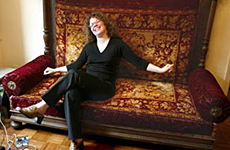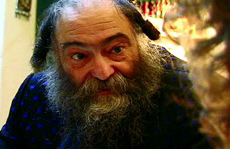Divan


A documentary about a woman who goes to Europe to find a couch? Uh, okay. Divan sounds like it is awful, but it is nothing but. Pearl Gluck makes a film that interweaves familial reconciliation, a search for identity, and a short history lesson all into a charming movie, all the more so because it is so intimate. Gluck lays bare her emotions on the screen, and it is obvious that the events in Divan really affected her. Her feelings are completely genuine, from the sadness of her partial estrangement from her father, to the sheer joy as she gets closer to her goal. Gluck is a normal American woman who just happened to grow up in a Hasidic community. As a child, her parents divorced, and she went with her mother, away from her insular Brooklyn community and out into the secular world.
A generation gap between parents and children, especially immigrants whose children are born here is normal. For Gluck, this gap was a chasm. Leaving the Hasidic community made her something of an outcast. Her untied hair and bare arms demonstrated how profanely she dressed. She was over thirty and not married, which made her an old maid in the eyes of many. Worst of all was a strained relationship with her father, who always expected her to return to Hasidism. Redemption came in the form of an old family story. The Gluck family, originally from Hungary, owned a couch, or as they called it, a divan. Famous rabbis slept there as they passed through town. Gluck was in Hungary on a Fulbright fellowship collecting oral histories, and when her father mentioned that he wanted the couch, she seized upon the opportunity as one that could lead towards a better relationship.
Divan looks "raw." It was filmed with hand held cameras, much of the time held by Gluck herself. The shots are all over the place, and sometimes out of focus. She interviews other people who left Hasidism for more secular lives as they sit in her living room on a huge divan. This is low-budget filmmaking. But while the quality of the picture and shots are not that great, it does not detract from the quality of the film. When watching Divan, it literally feels like the viewer is standing next to Gluck. It is intensely personal, and one can track her progress as she scours Hungary, meeting long-lost relatives in her search for the couch.
Returning the divan to her father becomes much more than an attempt to reconcile with him. Gluck is also searching for her identity. This is a universal theme that everybody can relate with, which immediately makes Divan accessible to everybody. Hasidism is a part of her father's life, and an integral part of her family history. By looking for the divan, she can examine her history and perhaps come to a better understanding about herself. Hasidism truly can be a different world to those unfamiliar with it. As a woman, the men around her ignore her, unless they feel she is bothering them. In Gluck's (Deprivation) capable hands, she and co-writer Zelda Greenstein interweave a primer on Hasidism with her personal quest to make a small, cute film that everybody can enjoy.